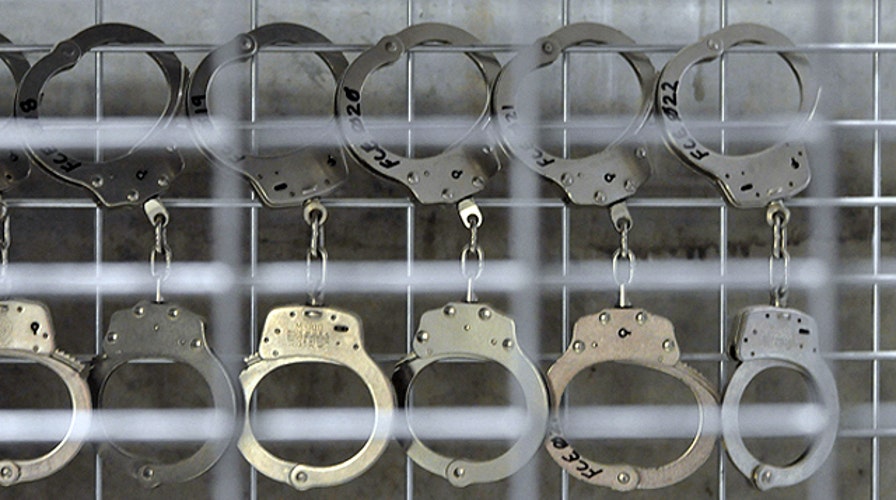Shocking study about arrests
Study finds alarming number of males under the age of 23 have been arrested in the US
This is a RUSH transcript from "The O'Reilly Factor," January 10, 2014. This copy may not be in its final form and may be updated.
Watch "The O'Reilly Factor" weeknights at 8 p.m. and 11 p.m. ET!
O'REILLY: "Impact Segment" tonight, shocking study by four American criminal justice professors.
(BEGIN VIDEO CLIP)
It says that nearly half of all black males under the age of 23 have been arrested in the U.S.A. And nearly 40 of white males in that age group have been arrested as well.
(END VIDEO CLIP)
The study examined data from 1997 to 2008. Joining us now from Albany, New York, Shawn Bushway, one of the professors who conducted the study. The doctor teaches at Albany State University. What are these young people being arrested for primarily, doctor.
SHAWN BUSHWAY, PH.D, CRIMINAL JUSTICE PROFESSOR, ALBANY STATE UNIVERSITY: We know that, for people that are arrested for the first time, it's -- the majority are for relatively minor crimes like property destruction, drug possession, or disorderly conduct. But we specifically excluded minor traffic offenses from the study. So, --
O'REILLY: All right, so no traffic beefs.
BUSHWAY: -- for more serious crimes.
O'REILLY: Unless it's vehicular homicide or something like that.
BUSHWAY: No.
O'REILLY: No, no -- you know -- just driving beefs. But it seems to be a shockingly high number. I mean, one out of every two young black males arrested?
Does that say something about the United States. Are we in a decline of moral values.
(BEGIN VIDEO CLIP)
What does that say.
BUSHWAY: Well, I think, the first thing to realize is that -- and there's a relatively unique estimates. There's only one other estimate that we have in the literature, from 1967, in fact. And, at that time, they estimated 34 percent --
(END VIDEO CLIP)
-- of males in this country were arrested, at least once, by the age of 23. So, the current number is around 40 percent from our study.
So, you know, it isn't a new thing, this level of prevalence. And, I think, people have to be aware that when you're talking about arrests, this is a relatively common experience.
It's not rare. Having said that, there has been an increase, you know, in the last 40 years.
O'REILLY: All right.
BUSHWAY: And, I think, that's partly due to changes in policing practice.
O'REILLY: Now, we want to make a couple of points. Number one, arrest is not a conviction. You just studied arrests and not convictions. And, number two, --
BUSHWAY: Right.
O'REILLY: -- there seems to be a racial aspect here. Although, not as much as some thought, 38 percent for whites, 50 percent for blacks.
(BEGIN VIDEO CLIP)
You know, that's high. That's a high ratio. When you consider the unemployment rate for African-American young men, much, much higher than whites -- much, much higher.
Now, is this economically-driven in your study. Is it because we have, you know, an economy that's boom or bust.
(END VIDEO CLIP)
Does that have anything to do with it.
BUSHWAY: I mean, I think that, in terms of the racial aspect, it's interesting that we didn't find a racial difference for women. And these numbers aren't as high as -- if you look at the racial disparities for, say, arrest rates from the FBI.
But, I think, the difference is, we're asking a different question, which is, "What's the cumulative prevalence of at least one arrest." And so, here, the question here is just the level of, "Do you have an arrest," as opposed to how many arrests or whether you have more serious arrests.
O'REILLY: OK. But women, in general, -- men --
BUSHWAY: I think it's definitely possible.
O'REILLY: -- men overwhelmingly commit most of the crimes in this country, and are arrested for most of the crimes. I mean, it's like five, six to one arrests for women to men.
But I'm wondering if it is a sign of the times here that we have deteriorated as a country because people are more accepting of bad behavior. And that's theoretical. I don't know whether you got into that or not.
BUSHWAY: No, I think that -- you know, remember, the numbers aren't that different than what we found in the 1960s. And so, it's hard to argue that this has been a dramatic shift.
In terms of -- you know, we may be less tolerant of certain types of crimes than we were in the past. I don't know how many people got arrested for DWI in the 1960's. But I know more people get arrested for that kind of thing now.
O'REILLY: And drug possession, too. I would imagine.
BUSHWAY: Some of it, shifting standards -- and drug possession, yes, that's -- I mean, during the 80s and 90s, we saw dramatic increase in the arrest rates for certain types of crimes. And so, I think that's part of what you are picking up here.
Content and Programming Copyright 2012 Fox News Network, LLC. ALL RIGHTS RESERVED. Copyright 2012 CQ-Roll Call, Inc. All materials herein are protected by United States copyright law and may not be reproduced, distributed, transmitted, displayed, published or broadcast without the prior written permission of CQ-Roll Call. You may not alter or remove any trademark, copyright or other notice from copies of the content.

